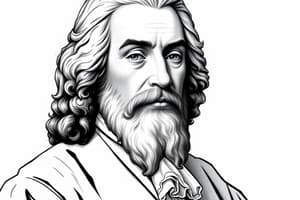Podcast
Questions and Answers
What is the Enlightenment?
What is the Enlightenment?
A period in history when human reason was valued, with many new ideas about politics, human nature, science, and religion.
What does Thomas Hobbes believe about human nature?
What does Thomas Hobbes believe about human nature?
Thomas Hobbes believes that people are naturally selfish and wicked.
What type of government did Thomas Hobbes believe in and why?
What type of government did Thomas Hobbes believe in and why?
Thomas Hobbes believed in an absolute monarchy because he thought a strong ruler was necessary to maintain order.
Which of Thomas Hobbes' beliefs are reflected in the quote about a common power keeping men in awe?
Which of Thomas Hobbes' beliefs are reflected in the quote about a common power keeping men in awe?
What does John Locke believe about human nature?
What does John Locke believe about human nature?
What contributions did John Locke make to American government?
What contributions did John Locke make to American government?
Which of John Locke's beliefs are reflected in his quote about the preservation of life, liberty, and property?
Which of John Locke's beliefs are reflected in his quote about the preservation of life, liberty, and property?
What does Jean-Jacques Rousseau believe about human nature?
What does Jean-Jacques Rousseau believe about human nature?
What were Jean-Jacques Rousseau's views on government?
What were Jean-Jacques Rousseau's views on government?
What ideas were presented in Rousseau's book, The Social Contract?
What ideas were presented in Rousseau's book, The Social Contract?
What impact did Rousseau have on world history?
What impact did Rousseau have on world history?
What does Baron de Montesquieu believe about human nature?
What does Baron de Montesquieu believe about human nature?
Flashcards are hidden until you start studying
Study Notes
Enlightenment Overview
- A pivotal period that valued human reason and promoted new ideas in politics, human nature, science, and religion.
Thomas Hobbes
- Described humans as inherently selfish, wicked, and untrustworthy.
- Advocated for an absolute monarchy to maintain order and safety.
- Believed strong governments prevent constant warfare among individuals.
- Emphasized the necessity of a powerful ruler to impose order and ensure obedience.
John Locke
- Proposed that all people are born equal and possess natural rights: life, liberty, and property.
- Argued that the government's primary role is to protect these rights.
- Stressed that governments derive their authority from the consent of the governed.
- Influenced the Declaration of Independence through his concepts of natural rights and governmental responsibility.
Jean-Jacques Rousseau
- Argued that humans are born good, happy, free, and equal but are corrupted by society.
- Supported direct democracy and believed people should be trusted to vote.
- Proposed a social contract where people relinquish some freedoms for governmental benefits.
- His ideas inspired the French Revolution and promoted the notion of equality in governance.
Baron de Montesquieu
- Believed humans are born equal but corrupted by societal influences and the pursuit of power.
- Advocated for a government structure with three branches to prevent the concentration of power and encourage accountability.
Studying That Suits You
Use AI to generate personalized quizzes and flashcards to suit your learning preferences.




